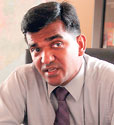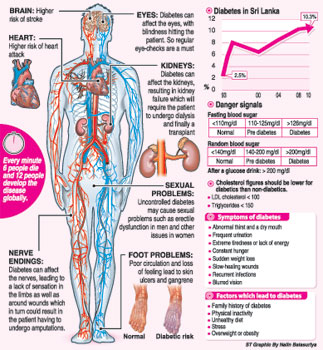The ‘Sri Lankan face’ of diabetes is changing………whereas earlier it depicted the older man or woman, current trends indicate more and more young and middle-aged adults.
A shocking one in 10 Sri Lankans is in the grip of diabetes, “the silent killer” which is prowling the country, sending figures of those affected higher than even in developed nations, the Sunday Times understands.
 |
| Dr. Prasad Katulanda |
Diabetes is becoming a huge epidemic, the biggest of any disease in recent times with both men and women being affected, stresses Consultant Endocrinologist and Diabetologist Dr. Prasad Katulanda of the University Medical Unit of the National Hospital, Colombo.
South Asian countries such as Sri Lanka, India, Pakistan and Bangladesh are acquiring the dubious reputation of having the highest prevalence rates of diabetes in the world, according to him, dispelling earlier beliefs that it is a disease of the western world, affecting affluent populations.
The grave reality of diabetes in Sri Lanka should not be ignored, pointed out Dr. Katulanda, as the country prepared for International Diabetes Day on November 14.
A study done in 2006, the latest, around the country except in the north and the east has found that 10.3% (one in 10) of the population is diabetic, as compared to a study in 1990 in Kandy which gave the figure of 2.5%.
Dealing with the “most important component” in a family, the mother and the grandmother, Dr. Katulanda explains that more and more women are falling victim to diabetes, as they are obese and physically inactive.
When the mother and the grandmother are ill, they are unable to fulfil their roles, which are not only important but also multi-faceted.
Referring to a major myth, this Diabetologist explains that some believe that diabetic medication causes kidney and liver diseases. No, he says, in fact it is the exact opposite. If they don’t take their medication it will be disastrous because if sugar levels are not controlled with medication as well as diet and exercise, they will develop kidney failure. It is then that they will not be able to use the medication.
Stepping back before the onset of Type 2 diabetes, Dr. Katulanda says prevention or delaying the onset would be the ideal. This can be done by resorting to healthy dietary practices (restriction of carbohydrates and fats to suit the level of action, consuming more green and leafy vegetables and proteins such as fish and white meat like skinless chicken rather than red meats like beef and pork) and regular physical exercise.
The right body mass index (BMI) should be 23 and the waist circumference for men below 90 cm and women below 80 cm, the Sunday Times learns.
Cut down the intake of refined sugar and sweets as well as fatty food, he urges, while taking exercise in the form of at least a brisk 30-minute walk daily. More exercise, the better.
If suffering from osteoarthritis which may hinder walking, take to other exercises like swimming after seeking medical advice, he says.
Making a strong and urgent call to policy-makers to curtail the diabetes epidemic, Dr. Katulanda seeks the promotion of healthy eating practices by having proper labelling of food items as well as restricting unhealthy food in canteens etc at different levels, be it schools, offices and industries, while introducing physical activity.
The construction industry and town planners too must take heed, introducing simple measures like a car park not right at the door of a building but farther away so that people have to walk a distance, according to Dr. Katulanda. The pavements should be even and built up, making walking easier while walkways and cycle paths should also be set up.
While requesting the establishment of eye-screening and foot care services at national level to prevent complications for diabetics, he urges that the HBALC (glycosylated haemoglobin) test should be made freely available in all state hospitals.
Prevention and control of diabetes will save huge sums of money for the government when compared to what it will have to spend on treating complications and dealing with diabetic disabilities, adds Dr. Katulanda.
Join the walk to create
awareness
The ‘Diabetes Walk 2010’ next Sunday, November 14, will start from Independence Square at 8 a.m. and proceed to the BMICH via Royal College. The walk will be preceded by an aerobic exercise session.
The walk will be followed at 10 a.m. by a two-hour stakeholder meeting at "Mihilakamadura" BMICH with the participation of Health Minister Maithripala Sirisena, ministry officials, professionals and community leaders. It will include a song and a drama on diabetes.
There will be a mini exhibition on diabetes with stalls from private hospitals, nutrition institutes etc.
Most importantly, participants will be able to undergo a random blood sugar test and eye retinopathy screening free of charge.
Say no to junk food, fizzy drinks...
Save the children from diabetes, is the fervent appeal of Dr. Katulanda who explains that the seeds of this disease are in fact sown in childhood.
A bad diet of junk food including sweets, fried stuff and fizzy drinks, sans green and leafy vegetables, aggravated by lack of physical activity due to being glued to the TV, computer or the study table will inexorably lead to childhood obesity and diabetes later on, he warns.
The younger a person gets diabetes, the more chances of developing complications, he points out. |




